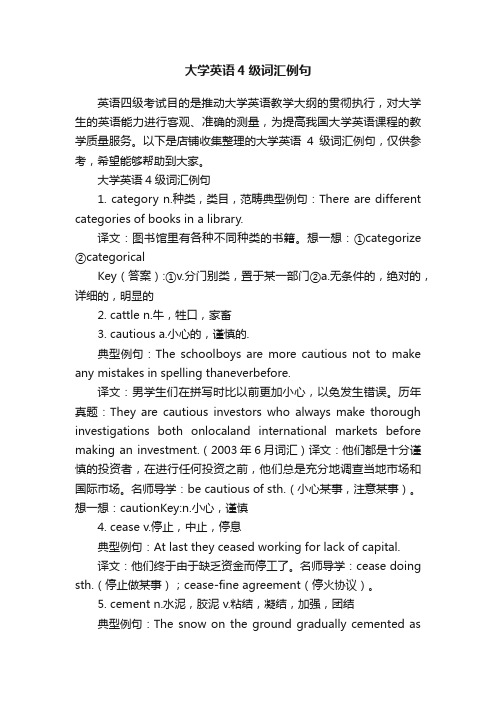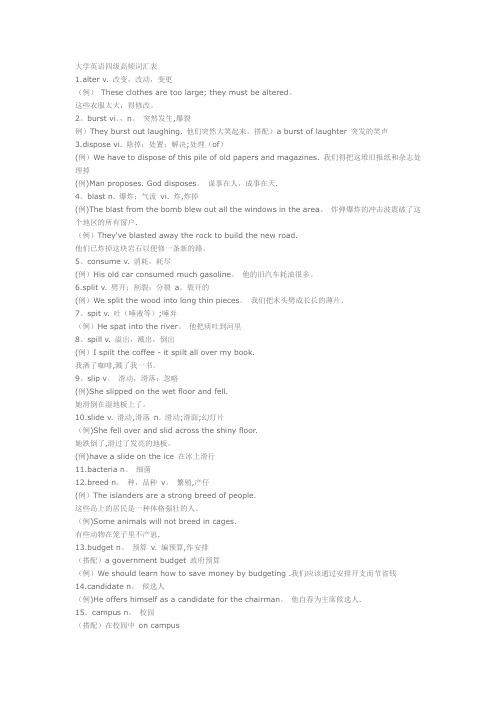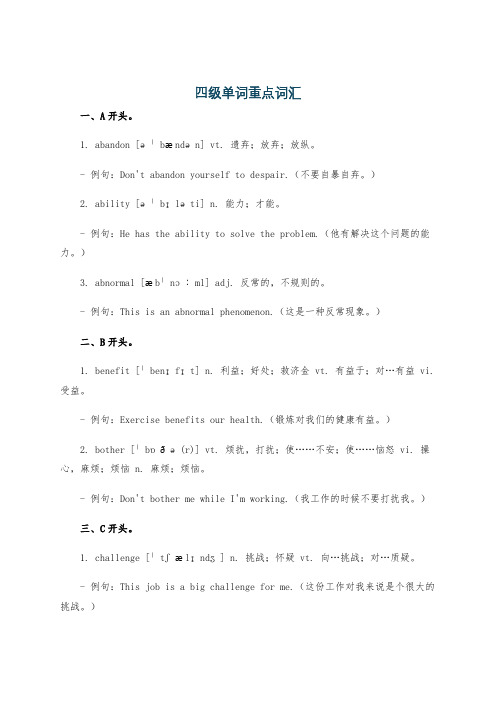英语四级考试常考词汇及例句解析
大学英语4级词汇例句

大学英语4级词汇例句英语四级考试目的是推动大学英语教学大纲的贯彻执行,对大学生的英语能力进行客观、准确的测量,为提高我国大学英语课程的教学质量服务。
以下是店铺收集整理的大学英语4级词汇例句,仅供参考,希望能够帮助到大家。
大学英语4级词汇例句1. category n.种类,类目,范畴典型例句:There are different categories of books in a library.译文:图书馆里有各种不同种类的书籍。
想一想:①categorize ②categoricalKey(答案):①v.分门别类,置于某一部门②a.无条件的,绝对的,详细的,明显的2. cattle n.牛,牲口,家畜3. cautious a.小心的,谨慎的.典型例句:The schoolboys are more cautious not to make any mistakes in spelling thaneverbefore.译文:男学生们在拼写时比以前更加小心,以免发生错误。
历年真题:They are cautious investors who always make thorough investigations both onlocaland international markets before making an investment.(2003年6月词汇)译文:他们都是十分谨慎的投资者,在进行任何投资之前,他们总是充分地调查当地市场和国际市场。
名师导学:be cautious of sth.(小心某事,注意某事)。
想一想:cautionKey:n.小心,谨慎4. cease v.停止,中止,停息典型例句:At last they ceased working for lack of capital.译文:他们终于由于缺乏资金而停工了。
名师导学:cease doing sth.(停止做某事);cease-fine agreement(停火协议)。
大学英语四级高频词汇表(附例句)

大学英语四级高频词汇表1.alter v. 改变,改动,变更(例)These clothes are too large; they must be altered。
这些衣服太大,得修改。
2。
burst vi。
,n。
突然发生,爆裂例)They burst out laughing. 他们突然大笑起来。
搭配)a burst of laughter 突发的笑声3.dispose vi. 除掉;处置;解决;处理(of)(例)We have to dispose of this pile of old papers and magazines. 我们得把这堆旧报纸和杂志处理掉(例)Man proposes. God disposes。
谋事在人,成事在天.4。
blast n. 爆炸;气流vi. 炸,炸掉(例)The blast from the bomb blew out all the windows in the area。
炸弹爆炸的冲击波震破了这个地区的所有窗户.(例)They've blasted away the rock to build the new road.他们已炸掉这块岩石以便修一条新的路。
5。
consume v. 消耗,耗尽(例)His old car consumed much gasoline。
他的旧汽车耗油很多。
6.split v. 劈开;割裂;分裂a。
裂开的(例)We split the wood into long thin pieces。
我们把木头劈成长长的薄片.7。
spit v. 吐(唾液等);唾弃(例)He spat into the river。
他把痰吐到河里8。
spill v. 溢出,溅出,倒出(例)I spilt the coffee - it spilt all over my book.我洒了咖啡,溅了我一书。
9。
slip v。
滑动,滑落;忽略(例)She slipped on the wet floor and fell.她滑倒在湿地板上了。
大学英语四级高频词汇及例句整理

大学英语四级高频词汇及例句整理2022年大学英语四级高频词汇及例句整理机会往往是从指缝中溜走的,2022年大学英语四级考试就要到来了,同学们抓紧时间好好复习吧,下面是店铺为大家搜索整理的2022年大学英语四级高频词汇及例句整理,希望能给大家带来帮助!大学英语四级高频词汇及例句整理1resistantThe researchers are already working with food companies keen to see if their products can be made resistant to bacterial attack through alterations to the food's structure.(2000.1)。
【全真测试】A. 微弱的 B. 威胁的 C. 抵抗的【译文】研究人员已经和食品公司联合起来希望他们的产品能通过改变食品的结构来抵抗细菌的侵袭。
【四级词义】adj. (to)抵抗的,抗……的,耐……的【巧记】resistant=resist.(v. 抵抗)+ -ant(形容词后缀)【猜一猜】resistance【Key】n. 反抗 (-ance名词后缀)barrenThat remote barren land has blossomed into rich.【全真测试】A. 稀少的 B. 贫瘠的 C. 富饶的【译文】穷乡僻壤已经富裕起来了。
【四级词义】adj. 贫瘠的resolveFinally, other people may give us instrumental supports—financial aid, material resources, and needed services—that can help us resolve and cope with our problems.【全真测试】A. 思索 B. 解决 C. 完成【译文】最后,其他人或许给我们有作用的支持——资金援助、物资和需要的服务——能够帮助我们解决和处理我们的问题。
四级高频词汇+例句(免费)

高频词汇1.alter ['ɔ:ltə] v. 改变,改动,变更I think we shall have to alter our plan. 我想我们必须修改我们的计划。
2.burst [bə:st] vi.,n. 突然发生,爆裂The storm burst and we all got wet.暴风雨突然袭来,我们都淋湿了。
3.dispose [dis'pəuz] vi. 除掉;处置;解决;处理(of)I can dispose of all his arguments easily.我能轻而易举地驳倒他所有的论点。
4.blast ['baiəu,blæst] n. 爆炸;气流 vi. 炸,炸掉No one was hurt in the blast early this morning. 早上的这次爆炸事件所幸没有人员伤亡。
5.consume [kən'sju:m] v. 消耗,耗尽But can people consume too much folic acid? 但人们真能服用如此多的维生素B吗?6.split [split] v. 劈开;割裂;分裂 a.裂开The wood must be split up for fuel. 必须把这块木头劈开作燃料。
7.spit [spit] v. 吐(唾液等);唾弃It is illegal to spit on a sidewalk. 在人行道上吐痰是违法的。
8.spill [spil] v. 溢出,溅出,倒出And this year the oil spill has added its own complications.同时今年的漏油事故使自身情况愈加复杂。
9.slip [slip] v. 滑动,滑落;忽略I let the day slip away without doing anything at all.那一天我什么事情也没做,就让日子白白溜过去了。
四级高频词汇解析必备单词一览

四级高频词汇解析必备单词一览词汇是语言运用的基础,尤其对于英语学习者来说,积累并准确理解高频词汇是提升语言运用能力的关键。
本文将为大家呈现四级高频词汇的一览表,并进行相关解析,旨在帮助读者更好地掌握这些必备单词。
1. abandon词性:动词解析:表示放弃、遗弃或抛弃某人或某事物。
在四级考试中,一般用于描述某人放弃决定、放弃计划、放弃信念等。
例如,"He had to abandon his dream of becoming a musician due to financial difficulties."2. accurate词性:形容词解析:表示准确无误、精确的。
在考试中常用于描述某事物、某数据或某人的行为准确度高。
例如,"The weather forecast turned out to be accurate."3. acknowledge词性:动词解析:表示承认、确认、鸣谢等。
在考试中常用于表达对某个事实、观点或某人的贡献表示认可或感谢。
例如,"We must acknowledge the importance of education in shaping a better future."词性:动词解析:表示获取、获得某物、某技能或某品质等。
在考试中常用于描述某人通过学习、工作等方式获得新的知识或技能。
例如,"She acquired fluency in Spanish after studying abroad for a year."5. adapt词性:动词解析:表示适应、调整某人或某事物以适应新环境、新要求等。
在考试中常用于描述个人或事物对新的变化做出调整。
例如,"We need to adapt our teaching methods to the needs of the students."6. adequate词性:形容词解析:表示足够的、充足的。
四级单词重点词汇

四级单词重点词汇一、A开头。
1. abandon [əˈbændən] vt. 遗弃;放弃;放纵。
- 例句:Don't abandon yourself to despair.(不要自暴自弃。
)2. ability [əˈbɪləti] n. 能力;才能。
- 例句:He has the ability to solve the problem.(他有解决这个问题的能力。
)3. abnormal [æbˈnɔːml] adj. 反常的,不规则的。
- 例句:This is an abnormal phenomenon.(这是一种反常现象。
)二、B开头。
1. benefit [ˈbenɪfɪt] n. 利益;好处;救济金 vt. 有益于;对…有益 vi. 受益。
- 例句:Exercise benefits our health.(锻炼对我们的健康有益。
)2. bother [ˈbɒðə(r)] vt. 烦扰,打扰;使……不安;使……恼怒 vi. 操心,麻烦;烦恼 n. 麻烦;烦恼。
- 例句:Don't bother me while I'm working.(我工作的时候不要打扰我。
)三、C开头。
1. challenge [ˈtʃælɪndʒ] n. 挑战;怀疑 vt. 向…挑战;对…质疑。
- 例句:This job is a big challenge for me.(这份工作对我来说是个很大的挑战。
)2. circumstance [ˈsɜːkəmstəns] n. 环境;情况;事件。
- 例句:Under no circumstances should you give up.(在任何情况下你都不应该放弃。
)四、D开头。
1. diverse [daɪˈvɜːs] adj. 不同的;多种多样的;变化多的。
- 例句:There are diverse cultures in this city.(这个城市有多种多样的文化。
英语四级考试高频词汇及例句详解
英语四级考试高频词汇及例句详解一(1)identify i-den-ti-fyvt.认出,鉴定;把…等同于[例句]He must use the sounds of speech to identify the words spoken, understand the pattern of organization of the words (sentences), and finally interpret the meaning.(2006年12月完形填空)[译文]他必须通过说话者的声音来确定其所说的话,理解词(句)的结构,最后解释所说的意思。
[用法]be identified with 被视为与…等同(2)statement state-ment n.陈述,声明;结算单,报表[例句]The author’s purpose in writing this article is to support the statement made by York Onnen.(2005年1月阅读2,20题选项之一)[译文]作者写这篇文章的目的是为了支持York Onnen的说法。
[用法]statement on/about关于…声明/陈述(3)status sta-tus n.地位,身份;情形,状况[例句]Authorities said the undocumented workers’illegal status made them open to blackmail (讹诈)by terrorists.(2006年6月阅读2)[译文]当局说,无居住许可的工人的身份是不合法的,所以他们很容易受到恐怖分子的讹诈。
(4)afford af-ford vt.担负得起;提供[例句]Not all advertisers can afford to use it.(2008年6月快速阅读)[译文]并不是所有的广告商都用得起(经济方面)。
四级常见词汇复杂例句及解析
四级常见词汇复杂例句及解析一、“ambiguous”(形容词,[æmˈbɪɡjuəs])例句:The politician gave an ambiguous answer, leaving the reporters confused about his stance on the issue.(这位政治家给出了一个模棱两可的答案,让记者们对他在这个问题上的立场感到困惑。
)解析:“ambiguous”形容事物或表达具有多种可能的解释,不明确、含糊不清的意思。
在这个句子中,政治家的回答不明确,所以让记者困惑。
二、“conspicuous”(形容词,[kənˈspɪkjuəs])例句:Her red hat was very conspicuous in the crowd.(她的红色帽子在人群中非常显眼。
)解析:“conspicuous”表示容易被看到或注意到的,突出的。
这里红色帽子在人群中很容易被发现,所以是显眼的。
三、“dilemma”(名词,[dɪˈlemə])例句:He was in a dilemma whether to accept the job offer with a low salary but good prospects or wait for a better - paying one.(他陷入了两难境地,不知道是接受这份薪水低但前景好的工作邀请,还是等待一份薪水更高的工作。
)解析:“dilemma”指的是在两种(或多种)困难的选择之间,难以决定的处境。
句子中的他面临着两种不同选择的困境。
四、“elaborate”(形容词:[ɪˈlæbərət];动词:[ɪˈlæbəreɪt])1. 形容词例句。
The elaborate design of the palace impressed all the visitors.(宫殿精心的设计给所有游客留下了深刻印象。
4级英语高频词汇
4级英语高频词汇一、A开头。
1. abandon [əˈbændən] vt. 遗弃;放弃;放纵。
- 例句:Don't abandon yourself to despair.(不要自暴自弃。
)2. ability [əˈbɪləti] n. 能力;才能。
- 例句:He has the ability to solve this problem.(他有能力解决这个问题。
)3. abnormal [æbˈnɔːml] adj. 反常的;不规则的。
- 例句:This abnormal weather has caused a lot of problems.(这种反常的天气造成了很多问题。
)二、B开头。
1. benefit [ˈbenɪfɪt] n. 利益;好处;救济金 vt. 有益于;对…有益 vi. 受益。
- 例句:Exercise benefits our health.(锻炼有益于我们的健康。
)2. bother [ˈbɒðə(r)] vt. 烦扰;打扰;使……不安;使……恼怒 vi. 操心;麻烦;烦恼 n. 麻烦;烦恼。
- 例句:Don't bother me while I'm working.(我工作的时候不要打扰我。
)3. boundary [ˈbaʊndri] n. 边界;范围;分界线。
- 例句:The river forms the boundary between the two countries.(这条河形成了两国之间的边界。
)三、C开头。
1. challenge [ˈtʃælɪndʒ] n. 挑战;怀疑 vt. 向…挑战。
- 例句:We should face the challenge bravely.(我们应该勇敢地面对挑战。
)2. circumstance [ˈsɜːkəmstəns] n. 环境;情况;事件。
四级必背词汇
四级必背词汇四级必背词汇是英语四级考试中常出现的高频词汇,掌握这些词汇对于提高英语水平和应对考试有着重要的意义。
下面将介绍一些常见的四级必背词汇,并给出其相应的解释和用法示例。
1. abandon:放弃,抛弃- Many people abandon their pets when they go on vacation. 2. abundant:丰富的,充足的- This region is abundant in natural resources.3. accelerate:加速- The car accelerated as it approached the intersection.4. accurate:准确的- The weather forecast was accurate and we brought our umbrellas just in time.5. achieve:实现,达到- He worked hard to achieve his dream of becoming a doctor.6. acknowledge:承认,认可- The company acknowledged its mistake and apologized to its customers.7. acquire:获得,取得- She acquired a new skill after attending a training workshop.8. adapt:适应,使适应- It took her some time to adapt to the new environment.9. adequate:足够的,充足的- The company provided its employees with adequate training for the new software.10. adjust:调整,适应- Please adjust the volume of the TV to a comfortable level.11. administer:管理,执行- The nurse will administer the medication to the patient. 12. advocate:提倡,拥护- Many people advocate for stricter gun control laws.13. aid:帮助,援助- The Red Cross provides aid to those affected by natural disasters.14. alert:警惕的,警觉的- Be alert and watch out for any suspicious activity.15. allocate:分配,拨出- The government plans to allocate more funds for education.16. alter:改变,修改- He decided to alter his travel plans and go to a different destination.17. analyze:分析,分解- The scientist analyzed the data and drew some interesting conclusions.18. annual:每年的,年度的- The company holds its annual meeting in December.19. anticipate:预期,预料- We anticipate that the project will be completed by the end of the month.20. anxious:焦虑的,担心的- She was anxious about the upcoming job interview.以上是一些常见的四级必背词汇及其用法示例。
- 1、下载文档前请自行甄别文档内容的完整性,平台不提供额外的编辑、内容补充、找答案等附加服务。
- 2、"仅部分预览"的文档,不可在线预览部分如存在完整性等问题,可反馈申请退款(可完整预览的文档不适用该条件!)。
- 3、如文档侵犯您的权益,请联系客服反馈,我们会尽快为您处理(人工客服工作时间:9:00-18:30)。
1. chronic a. 慢性的;严重的
chronic可指疾病长期的,慢性的或连续复发的,如:
Arthritis is a chronic disease.
关节炎是一种慢性病。
另外,chronic还可指某种问题长期存在的,习惯性的,如:
Unemployment has been a chronic problem in this country.
在这个国家,失业问题长期存在。
2. circulation n. 循环;发行(量)
circulation的动词形式是circulate。
Reader has a large circulation in China.
《读者》在中国发行量很大。
3. climax n. 高潮;顶点,最高点 v. (使)达到顶点(或高潮)
Here comes the climax of the play.
整场戏的高潮来了。
4. cling to v. 紧紧抓住,依恋;坚持,墨守
英语中表示坚持的词还有很多,如insist,persist,adhere等,它们的区别如下:
cling 与to连用,指对信仰、意见、习惯等的坚持。
adhere 也与to连用,指坚持意见、计划或承诺等,含有坚持不懈的意思。
insist 通常用于对意见、主张等的坚持。
persist 用于褒义时指坚持继续做某事,但更常用于贬义,指不听劝告,顽固坚持。
persevere 含褒义,强调坚持不懈的努力。
cling的过去式和过去分词是clung,cling to sth.=become attached to sth.
Don't cling to your old ideas, it's 21 century now!
别老是守着你的陈旧思想,现在都21世纪了。
5. coincidence n. 巧合;一致
by coincidence 碰巧,凑巧
What a coincidence!
真巧啊!
6. collaboration n. 合作
in collaboration with sb. 与……合作
Our school is in collaboration with a middle school in America.
我们学校与美国的一所中学有合作。
7. collide v. 相撞;冲突
与collide类似表示冲突的词还有conflict,这两个词都是不及物动词,可与with连用。
collide可指严重的直接冲突,conflict指时间冲突或意见对立。
The two opinions collide with each other.
这两种意见相互冲突。
8. commence v. 开始
表示”开始“的词还有begin,start等,它们的细微区别如下:
commence 正式用词,较书面化,语气庄重,特指正式程序或一定仪式,或指某种正式行动“开始”。
begin 常见词,含义广泛,其反义词是end,多用于行动、工作等的开始。
start 在许多场合可与begin通用,但start侧重动作的起点。
initiate 指创始或发起,侧重某过程的第一步,不考虑结束,强调起始。
He commenced his postgraduate study in 2009.
他于2009年开始研究生学习。
9. commute v. 乘车上下班;通勤
I have to commute between the university town and the downtown area every day.
我每天上班在大学城和市区之间来回奔波。
10. compact a. 紧凑的, 结实的 v. (使)装满,紧密
The suitcase is so small that I have to compact my clothes.
行李箱太小了,我不得不把衣服紧紧地压在一起。
